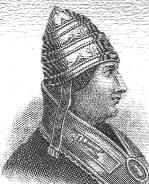 In
the person of Nicholas V the Renaissance mounted the fisherman's
throne. An enthusiastic patron of artists, scholars, and men of
letters, Nicholas did much to create a humanist atmosphere
around the papal court.
In
the person of Nicholas V the Renaissance mounted the fisherman's
throne. An enthusiastic patron of artists, scholars, and men of
letters, Nicholas did much to create a humanist atmosphere
around the papal court.
Thomas Parentucelli was born November 15th, 1397, probably at
Sarzana in Liguria. The son of a poor physician who died while
Thomas was yet a youngster, he was forced by lack of funds to
interrupt his studies at the University of Bologna to serve as
tutor to Florentine noble families. This stay at the capital of
the Renaissance during two formative years probably did much to
make him the humanist he was. He finally finished his course at
Bologna and joined the staff of Bologna's holy bishop Nicholas
Albergati. Ordained priest soon after, Thomas followed his
master to Rome when Albergati was made a cardinal. His wide
reading stood him in good stead when he was employed in delicate
negotiations with the Greeks at Florence. After this his rise
was rapid. Bishop of Bologna in 1444, cardinal in 1446, he was
elected pope in 1447. He took the name Nicholas V.
Nicholas achieved some brilliant successes. He arranged the
Concordat of Vienna with the Emperor Frederick III in 1448 and
put an end to any possibility of imperial support for the Basel
schismatics. In 1449 that ghost of a gathering, now in session
at Lausanne, wheezed its last. Antipope Felix V resigned.
Nicholas by his kindness made submission easy for all.
Emperor Frederick III came down to Rome in 1452 to be crowned
by Nicholas. He was the last emperor to be crowned at Rome. In
1450 Nicholas had proclaimed the jubilee and once more Rome was
filled with pilgrims.
Nicholas did much to promote reform. He sent out excellent
legates like the great Cardinal Nicholas of Cusa and the
Franciscan St. John Capistrano to work for reform in Germany.
Unfortunately on the other hand, Nicholas contributed to
creating a decidedly worldly atmosphere around the papal court
by employing such men as Lorenzo Valla, Pozzio, and Filelfo,
brilliant scholars, to be sure, but also downright filthy
writers.
A true child of the Renaissance, Nicholas was enthusiastic
about all forms of culture. His reign was a real golden age for
hungry artists. While humanists like Valla were put to work
translating Thucydides, artists like Fra Angelico were painting
masterpieces on Vatican walls and architects like Alberti were
working on the Belvedere. Meanwhile, spurred on by lavish papal
rewards, searchers were combing ancient monasteries for
classical manuscripts. And here, perhaps, is the chief title of
honor for Nicholas V. He was the founder of the Vatican Library.
Two events saddened the last years of the humanist Pope. In
1453 his heart was wrenched by the fall of Constantinople. While
the West supinely stood by, Mohammed II broke through the walls
and put a final period to the Roman Empire of the East. Nicholas
had given what help he could. It was not enough and it was not
in time.
Early in 1453 a gentleman named Stephen Porcaro, on fire with
humanist ideals of ancient republican Rome, launched a
conspiracy to overthrow the Pope. Though the plot was foiled,
Nicholas was badly shaken. From 1453 to his death in 1455
Nicholas was tormented by gout and other sicknesses. On November
15, 1455, the humanist Pope died, his eyes fixed on the
crucifix.
Excerpted from "Popes
Through the Ages" by Joseph Brusher, S.J.

